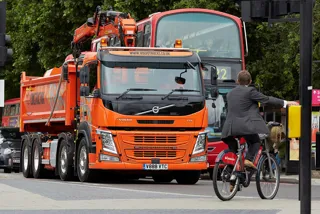Fleets operators are being urged to respond to a consultation from Transport for London (TfL) which is proposing an increase in Penalty Charge Notices (PCNs). The consultation was launched on September 4 for traffic offences in the capital, including parking on red routes and the non-payment of the congestion charge.
Hauliers could face an increase in the cost of parking tickets from £130 to £160, if the proposals go ahead, netting TfL up to £45 million a year in extra revenue.
The Freight Transport Association (FTA) is calling on its members to respond directly to the consultation – alongside its own response – to outline the impact this could have on businesses transporting goods in and out of the capital.
Natalie Chapman, London policy manager at the FTA, said: “We are opposed to the increase in PCNs. A number of our members pick up PCNs daily, despite operating in a compliant manner. It is sometimes not possible to load or unload safely without picking up fines.”
TfL says the price hike is needed to ensure greater compliance on the roads and therefore improve traffic flow.
Paul Cowperthwaite, general manager for road user charging at TfL, said: “We are committed to keeping the capital moving. By improving compliance we can help keep junctions and roads clear, which, if blocked, have a significant impact to all road users.
“The overwhelming majority of motorists follow the rules. However we have seen a steady increase in the number of motorists flouting them so it is clear the current PCN level is not as effective as it once was.”
In the past five years, there has been a 12% increase in the number of motorists issued with PCNs, from 1.3m in 2011/12 to 1.5m in 2016/17.
In the same period, the number of repeat offenders has risen from 59.9% to 64.1%. TfL believes this is because PCNs no longer act as a deterrent.
However, fleet operators often struggle to find adequate space to safely park and unload in the capital.
Chapman explained: “The issue businesses are already facing is to either not make the delivery and lose business or make the delivery and risk getting a fine.
“Dependent on the nature of the goods it is not always possible to unload further up the road. Many companies just accept the fines as a business cost.”
TfL says all the money it makes from PCNs is reinvested back into the road and public transport network.
To put the proposed increases in context, if an operator gets just three parking tickets a week it could face additional costs of more than £4,500 per year.
Jerry Ward, manager – legal operations (Transport) at John Lewis, believes TfL should apply a lighter touch when it comes to dealing with commercial vehicle operators.
“If you take a commercial vehicle into London you aren’t doing it for pleasure. It’s for a purpose,” he said. “Vans and trucks are putting beer in the pubs and food on the shelves – that helps the economy grow and keeps the capital running.”
While John Lewis doesn’t get inundated with PCNs, Ward said sometimes they are unavoidable.
“There is less kerb space and there are issues controlling what is there. When we get to a loading bay it is sometimes full of cars and other vehicles,” he explained.
A number of businesses are now looking at alternatives, such as delivering out of hours, but this has its own constraints in the form of noise level controls.
“It’s a difficult balance, people don’t want to be woken up in the night from the sound of a truck making a delivery, but they still want to be able to go to the shop and pick up a fresh loaf of bread in the morning,” said Ward.
The consultation closes on November 10 and TfL would like to know whether fleets think it might be possible to encourage road users to obey the rules in any other way or if they believe a particular group of road users will be disadvantaged by the proposal.
All the responses will be collated and a report sent to the mayor of London, who will make the final decision.





















Login to comment
Comments
No comments have been made yet.